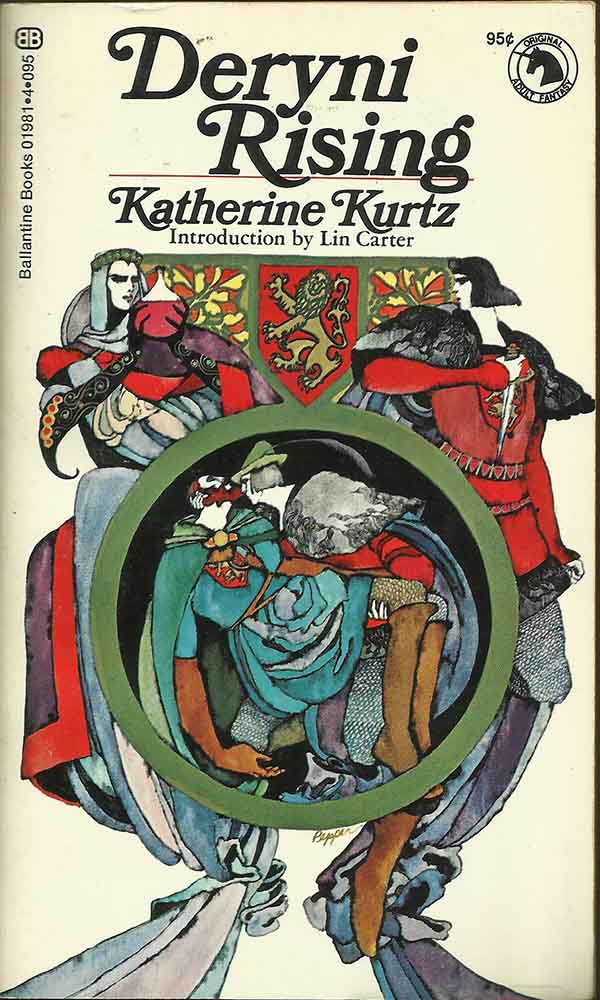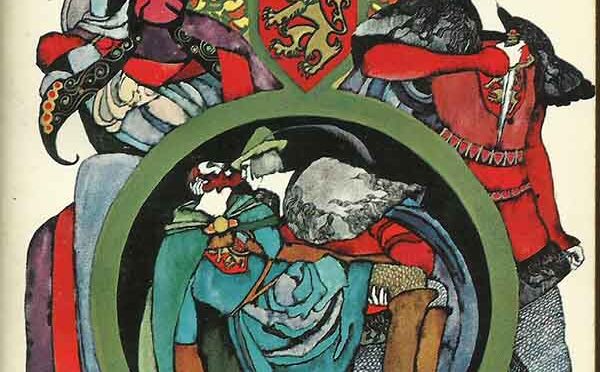Are you finding us from Worldcon?
Join us in Portal 55 (a great deal of DISCORD there…) for weekly broadcasts and perennial discussion!

by Cora Buhlert
The Fantasy Resurgence
The fantasy genre, science fiction's weirder sister, is currently experiencing something of a boom. The enormous success of the paperback editions of J.R.R. Tolkien's Lord of the Rings and Lancer's reprints of Robert E. Howard's stories about Conan the Cimmerian have whetted the public's appetite for more fantastic fiction. As a result, many of the fantasy works of yesterday, long since relegated to dusty second-hand bookstores, are coming back into print.
In particular, the Ballantine Adult Fantasy series has been doing the Lord's work to bring long out of print fantasy fiction from the first half of the century back onto bookstore shelves in affordable paperback editions. I do quibble a bit with the "adult" part of the series title, since it reinforces the misconception that fantasy is mainly intended for children, but I cannot quibble with the series itself and the selection of titles, which is excellent. I know that I have been harsh on Lin Carter's work as a writer in the past, but he truly seems to have found his calling as editor of the Ballantine Adult Fantasy series.
Whenever I spot one of the distinctive psychedelic covers of the Ballantine Adult Fantasy series in the spinner rack of my trusty import bookstore, I pick it up at once, whether I'm familiar with the author or not. Because I know that these colourful covers and the unicorn colophon guarantee a good read.
So of course, I had to buy the latest offering in the series, already the nineteenth book to appear under the Ballantine Adult Fantasy banner: Deryni Rising by Katherine Kurtz.

I consider myself more familiar with the fantasy writers of thirty, forty, fifty or sixty years ago than the average person, yet to my infinite astonishment I had never heard of Katherine Kurtz before. However, it turned out to be not so surprising after all, because Katherine Kurtz is not a writer from decades ago. She's a brand-new writer, only twenty-five years old, and Deryni Rising is her debut. It turns out that the Ballantine Adult Fantasy series is branching out from reprints of older works to original fiction.
Welcome as it is to see the Ballantine Adult Fantasy series adding original fiction to its line-up, there is also an inherent risk. For can a brand-new novel, one by a debut author at that, stand side by side with the best works of past decades? At least in the case of Deryni Rising, the answer is yes.
Murder, Magic and Court Intrigue
Deryni Rising is set in the Kingdom of Gwynned which is very much an analogue to medieval England. What sets Gwynned apart from our world is that it is inhabited by two races: regular humans and the titular Deryni, an otherwise human race with magical abilities. The Deryni are viewed with suspicion by the people and the all-powerful church, which is very much an analogue to the Catholic church pre-Reformation, and were outright persecuted in the past. As a result, many Deryni hide and deny their abilities.
The novel opens with Brion Haldane, King of Gwynned, at a hunt, which is not going well, because the weather is foul and the hounds are untrained and keep losing the trail. But things are about to get much worse for Brion, for within twenty pages he is dead, murdered by the Deryni sorceress Charissa, who wants to rule Gwynned and who also wants revenge on Brion for killing her father fifteen years before. Of course, Charissa's father was a mad tyrant intent on oppressing the human populace, but Charissa does not see it that way.
Brion expires in the arms of his son and heir Prince Kelson. Kelson is smart, brave and has been groomed for rulership since he was a toddler. However, he's also two weeks shy of his fourteenth birthday and still very much a kid. And he has to deal with court intrigues, treachery, assassination attempts, a traitor on the council and the murderous Charissa.
Luckily, Kelson doesn't have to face all that alone. For just before his death, his father told Kelson that should anything happen to him, he should immediately send for General Alaric Morgan, the Duke of Corwyn, who is currently defending the northern borders of Gwynned. Kelson does comply with his father's last wish and recalls Morgan – against the opposition of his mother, Queen Jehana, and most of the court. For Morgan is half Deryni.
So far, Morgan was shielded from anti-Deryni prejudice by Brion Haldane, who considered Morgan his most trusted friend. But with Brion gone, Morgan has lost his most powerful ally and protector. And the rest of the court, including the royal council and Queen Jehana herself, at best distrust Morgan and at worst hate his guts. Particularly Jehana, who is a religious fanatic with a violent hatred of all things magic, will do everything in her power to get rid of Morgan and keep her son far away from him, even if that involves having Morgan executed on trumped up charges.
Kelson is able to save Morgan from execution – by stalling the council until the bells ring out the hour of his birth. Once the bells ring, it means that Kelson is fourteen years old and therefore considered of age, which means he is able to rule of his own accord, including overruling the council.
But if Kelson is to survive his coronation – and Charissa, who will surely crash the ceremony and challenge Kelson to a magical duel – the magical abilities Kelson inherited from his father will have to be unlocked with the help of Morgan's Deryni magic. However, in order to perform the ritual which will activate Kelson's latent abilities, Morgan, Kelson and Father Duncan McLain, Morgan's half Deryni cousin who became a priest of the very church that condemns and persecutes those like him, will have to decipher the mysterious instructions Brion left behind – while fending off yet more intrigues and assassination attempts.
The Boy King and His Protector
Deryni Rising is written in omniscient point-of-view and thus flits from character to character to tell the story through their eyes. And while Kelson is the nominal hero – and likeable enough, but also very clearly a teenaged boy – Morgan is the character in whose head we spent the most time. This is a wise choice, because Morgan is a fascinating character. We see him flirting with his notorious reputation and deliberately unsettling people who annoy him, but we also see his frustration at having to hold back his abilities, though he only wants to use them for good, and his weariness at encountering mistrust even from those who've known him for years.
We also see his deep grief for the loss of Brion Haldane, a man who was not just his king, but – to quote Morgan – was father and brother to him. For Morgan was orphaned young and sent to the royal court as a page at the age of only nine, where he quickly latched onto the slightly older Brion. Morgan loved Brion and indeed the word "love" is repeatedly used to describe their relationship. But while Morgan uses "love" in the platonic context of love for a close friend, I wonder if there wasn't some deeply buried romantic aspect to his feelings for Brion Haldane as well. For though Morgan is around thirty at the time of Deryni Rising, he's not married and seems to view women mostly as an irritation. Of course, expressing any romantic feelings for a member of the same sex would be even deadlier than being Deryni in this world, though it would give Queen Jehana an additional reason to hate Morgan.
Morgan's relationship with Kelson is very much that of a surrogate father. The mutual affection between these two is notable in almost every scene, whether it's Morgan tenderly putting the exhausted Kelson to bed and keeping watch by his side or the mutual ribbing when Kelson and Morgan have to deal with an army of servants dressing them for the coronation – even though they both very much dislike being fussed over.
Early in the novel, when Morgan and Kelson are first reunited after the death of Kelson's father, Kelson just wants to fling his arms around Morgan and hug him – but he is an adult now, almost fourteen, and king besides, so he doesn't. Meanwhile Morgan knows that protocol demands that he formally kneel before his new king, but senses that this isn't what Kelson wants or needs right now, so they both just stand there awkwardly.
Deryni Rising is very much dominated by male characters. There are only two female characters of note: the villainous sorceress Charissa and Queen Jehana, and neither of them is particularly likeable. That said, their motivations are understandable. Charissa wants to avenge her father and take back what she believes should be hers. As for Jehana, her religious zeal and fanatic hatred of the Deryni to the point that she'd rather see her only son dead than using magic does not make her a pleasant character at all, but mostly just one more obstacle Kelson and Morgan have to overcome. Yet a revelation later in the novel explains why Jehana is the way she is.
Fantasy Inspired by History
The current fantasy boom mostly follows one of two lodestars mentioned at the beginning: either Robert E. Howard's Conan the Cimmerian and J.R.R. Tolkien's Lord of the Rings. More or less blatant Conan clones litter the shelves right now, ranging from the good to the forgettable. Tolkien-influenced fantasy is thinner on the ground, though there are a few examples such as the wonderful The Face in the Frost by John Bellairs.
Deryni Rising does show some influence from both Tolkien and Robert E. Howard, but it is much more reminiscent of the historical novels of authors like Dorothy Dunnett, Jean Plaidy (a pen name of the gothic novelist Victoria Holt), Anya Seton, Maurice Druon, Zoe Oldenbourg, Lion Feuchtwanger, Anne Golon, Gaby von Schönthan and others. Both Lord of the Rings and the Conan stories are supposedly set on our Earth in the distant past according to their authors, though Middle Earth and the world of the Hyborian Age feel more like fantasy worlds. The Kingdom of Gwynned, on the other hand, does feel very much like medieval England, including the feudal relationships between liege lords and their vassals and the role of the (Catholic) church as utterly central to everybody's life. Katherine Kurtz is a graduate student of medieval history and it shows.
What sets the fictional Gwynned apart from medieval England is the existence of magic. Though Kurtz's magic is a far cry from dark and strange magic of Robert E. Howard or the powerful magic both good and evil of J.R.R. Tolkien. The abilities of the Deryni – telepathy, teleportation, hypnosis, healing, projection, second sight – are closer to the psi powers found in many a science fiction story, particularly in Analog. And the way this magic is deployed is reminiscent of the practices of real life occult groups like the Rosicrucians, the Hermetic Order of the Golden Dawn or the Fraternity of the Inner Light and requires focus, concentration, rituals, incantations and the occasional droplet of blood. Indeed, I wonder whether Katherine Kurtz has any experience with ritual occultism. In the world of Deryni Rising, magic also drains those who use it and we see the toll using his abilities takes on Morgan and also on Kelson who promptly passes out after the ritual that activates his latent abilities.
The persecution faced by the Deryni mirrors the persecution faced by many minority groups in the real world. Due to the fact that the Deryni have magic abilities, the witch hunts of the late Middle Ages and early modern era would be the most obvious parallel, but the persecution of religious minorities such as Cathars, Hussites, Anabaptists, Waldensians, Huguenots and many others also parallels the persecution of the Deryni.
Another likely parallel is the persecution of Jewish people in Europe from the Middle Ages up to the present day. Indeed, the strategies used by the various Deryni characters to deal with prejudice and persecution mirror those used by Jewish people throughout history. Those Deryni who hide and deny their abilities are reminiscent of the secret Jews of late Medieval Spain, some of whom – like Duncan McLain – explicitly joined a church which was hostile to them.
Meanwhile, Alaric Morgan's prominent position at court as a personal protegee of the king, only to see his privilege crumble once his protector dies, mirrors the story of Josef Süß Oppenheimer, adviser and secretary of finance to Duke Karl-Alexander of Württemberg, who found himself subjected to a show trial and executed on trumped up charges after the death of the Duke. The story of Josef Süß Oppenheimer has been the subject of several historical novels, most famously in Lion Feuchtwanger's 1925 novel Jud Süß, as well as of one of the most infamous Nazi era propaganda movies.
Standing on the Shoulders of Giants
As the first new novel to be published in the Ballantine Adult Fantasy series, Deryni Rising had to live up to the best fantasy of the past seventy years. The novel mostly managed that feat. It is not entirely without flaws, for which book is? Occasionally, some modern terms creep into what is supposed to be medieval world. The omniscient narration flitting between various characters means that the reader usually knows more than the characters, which can enhance suspense, but also ruin surprises.
But overall, Deryni Rising is an excellent fantasy novel, particularly considering it is the debut novel of a young writer. Supposedly, Deryni Rising is the first book in a trilogy and I for one can't wait to read the next adventures of King Kelson (I don't think I'm giving anything away when I say that he survives his coronation), Alaric Morgan (who also survives Kelson's coronation), Duncan McLain and the rest.
Five stars.
[New to the Journey? Read this for a brief introduction!] Follow  on BlueSky
on BlueSky 



I like it when a woman can tell me about intrigue and murder. It has always seemed to be the province of a man, but I think Mary Shelley has shown us all that women can be there just as well, and that's practically from the beginning. Since then women have shown us tremendous, tight storytelling that is sometimes matchless, and Katherine Kurtz is surely no exception. Lin Carter's introduction lets us know that men are till at hand.
Or "still", not "till".